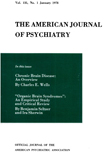Intolerance and extremism in a correctional institution: a perceived ethnic relations approach
Abstract
The authors used an ecological approach to analyze the interaction of ethnicity, environment, personality, and ideology that led to racial intolerance, ethnic strife, and the existence of a self-styled neo-Nazi group in a correctional institution for youthful offenders. Staff members completed a questionnaire on which they rated the behavior of each of 320 inmates toward his own and other ethnic groups. The inmate's membership, if any, in a "power" subgroup was also noted. Results indicated a correlation between antagonistic patterns of ethnic relations and receptivity to racial propaganda and ideology. Further research focusing on the perceived ethnic relations climate is necessary to determine whether the patterns found in this institution are typical and to ascertain explanations for this correlation.
Access content
To read the fulltext, please use one of the options below to sign in or purchase access.- Personal login
- Institutional Login
- Sign in via OpenAthens
- Register for access
-
Please login/register if you wish to pair your device and check access availability.
Not a subscriber?
PsychiatryOnline subscription options offer access to the DSM-5 library, books, journals, CME, and patient resources. This all-in-one virtual library provides psychiatrists and mental health professionals with key resources for diagnosis, treatment, research, and professional development.
Need more help? PsychiatryOnline Customer Service may be reached by emailing [email protected] or by calling 800-368-5777 (in the U.S.) or 703-907-7322 (outside the U.S.).



